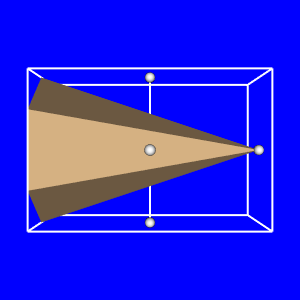BoxWidget2
Repository source: BoxWidget2
Description¶
This example uses a vtkBoxWidget2 to manipulate an actor. The widget only contains the interaction logic; the actual box is drawn by the accompanying vtkBoxRepresentation. Contrary to the older vtkBoxWidget, this widget doesn't provide functionality to assign it to one or more actors, so that has to be implemented manually. The box is dimensioned and positioned by passing a bounding box to PlaceWidget method, with the SetPlaceFactor method providing a scaling factor in relation to that bounding box. The transformations applied to the box can be used to manipulate any number of object(s), via a custom callback class, which is passed to the box widget through the AddObserver method.
The older implementation vtkBoxWidget provides functionality to receive a vtkProp3D for the initial positioning and sizing, but the transformation synchronization still needs to be done manually. See BoxWidget for a simple example of how to use it.
Other languages
See (PythonicAPI)
Question
If you have a question about this example, please use the VTK Discourse Forum
Code¶
BoxWidget2.cxx
#include <vtkActor.h>
#include <vtkBoxRepresentation.h>
#include <vtkBoxWidget2.h>
#include <vtkCommand.h>
#include <vtkConeSource.h>
#include <vtkInteractorStyleTrackballCamera.h>
#include <vtkNamedColors.h>
#include <vtkNew.h>
#include <vtkPolyDataMapper.h>
#include <vtkProperty.h>
#include <vtkRenderWindow.h>
#include <vtkRenderWindowInteractor.h>
#include <vtkRenderer.h>
#include <vtkTransform.h>
namespace {
class vtkBoxCallback : public vtkCommand
{
public:
static vtkBoxCallback* New()
{
return new vtkBoxCallback;
}
vtkSmartPointer<vtkActor> m_actor;
void SetActor(vtkSmartPointer<vtkActor> actor)
{
m_actor = actor;
}
virtual void Execute(vtkObject* caller, unsigned long, void*)
{
vtkSmartPointer<vtkBoxWidget2> boxWidget =
dynamic_cast<vtkBoxWidget2*>(caller);
vtkNew<vtkTransform> t;
dynamic_cast<vtkBoxRepresentation*>(boxWidget->GetRepresentation())
->GetTransform(t);
this->m_actor->SetUserTransform(t);
}
vtkBoxCallback()
{
}
};
} // namespace
int main(int vtkNotUsed(argc), char* vtkNotUsed(argv)[])
{
vtkNew<vtkNamedColors> colors;
vtkNew<vtkConeSource> coneSource;
coneSource->SetHeight(1.5);
vtkNew<vtkPolyDataMapper> mapper;
mapper->SetInputConnection(coneSource->GetOutputPort());
vtkNew<vtkActor> actor;
actor->SetMapper(mapper);
actor->GetProperty()->SetColor(colors->GetColor3d("BurlyWood").GetData());
vtkNew<vtkRenderer> renderer;
renderer->AddActor(actor);
renderer->SetBackground(colors->GetColor3d("Blue").GetData());
renderer->ResetCamera(); // Reposition camera so the whole scene is visible
vtkNew<vtkRenderWindow> renderWindow;
renderWindow->AddRenderer(renderer);
renderWindow->SetWindowName("BoxWidget2");
vtkNew<vtkRenderWindowInteractor> renderWindowInteractor;
renderWindowInteractor->SetRenderWindow(renderWindow);
// Use the "trackball camera" interactor style, rather than the default
// "joystick camera"
vtkNew<vtkInteractorStyleTrackballCamera> style;
renderWindowInteractor->SetInteractorStyle(style);
vtkNew<vtkBoxWidget2> boxWidget;
boxWidget->SetInteractor(renderWindowInteractor);
boxWidget->GetRepresentation()->SetPlaceFactor(1); // Default is 0.5
boxWidget->GetRepresentation()->PlaceWidget(actor->GetBounds());
// Set up a callback for the interactor to call so we can manipulate the actor
vtkNew<vtkBoxCallback> boxCallback;
boxCallback->SetActor(actor);
boxWidget->AddObserver(vtkCommand::InteractionEvent, boxCallback);
boxWidget->On();
renderWindow->Render();
renderWindowInteractor->Start();
return EXIT_SUCCESS;
}
CMakeLists.txt¶
cmake_minimum_required(VERSION 3.12 FATAL_ERROR)
project(BoxWidget2)
find_package(VTK COMPONENTS
CommonColor
CommonCore
CommonTransforms
FiltersSources
InteractionStyle
InteractionWidgets
RenderingContextOpenGL2
RenderingCore
RenderingFreeType
RenderingGL2PSOpenGL2
RenderingOpenGL2
)
if (NOT VTK_FOUND)
message(FATAL_ERROR "BoxWidget2: Unable to find the VTK build folder.")
endif()
# Prevent a "command line is too long" failure in Windows.
set(CMAKE_NINJA_FORCE_RESPONSE_FILE "ON" CACHE BOOL "Force Ninja to use response files.")
add_executable(BoxWidget2 MACOSX_BUNDLE BoxWidget2.cxx )
target_link_libraries(BoxWidget2 PRIVATE ${VTK_LIBRARIES}
)
# vtk_module_autoinit is needed
vtk_module_autoinit(
TARGETS BoxWidget2
MODULES ${VTK_LIBRARIES}
)
Download and Build BoxWidget2¶
Click here to download BoxWidget2 and its CMakeLists.txt file. Once the tarball BoxWidget2.tar has been downloaded and extracted,
cd BoxWidget2/build
If VTK is installed:
cmake ..
If VTK is not installed but compiled on your system, you will need to specify the path to your VTK build:
cmake -DVTK_DIR:PATH=/home/me/vtk_build ..
Build the project:
make
and run it:
./BoxWidget2
WINDOWS USERS
Be sure to add the VTK bin directory to your path. This will resolve the VTK dll's at run time.
